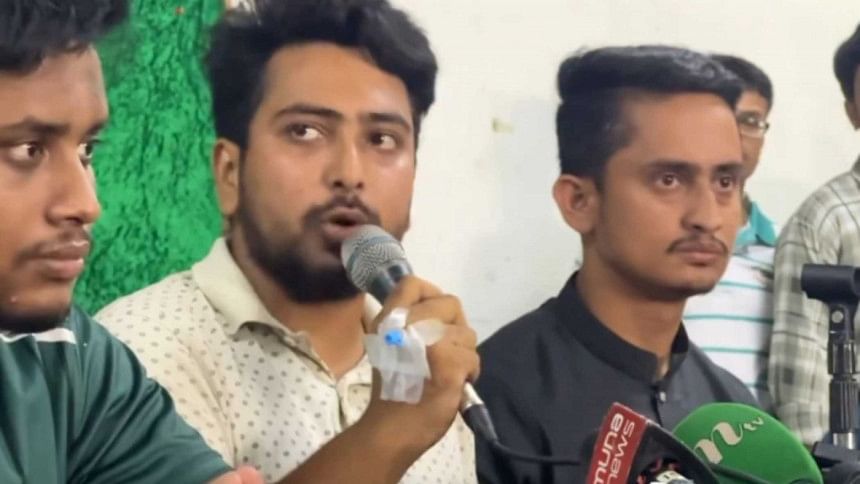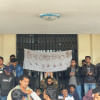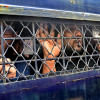4 organisers of quota reform demonstration reject circular

Four key organisers of the quota reform demonstration have said the protests would continue after they rejected yesterday's government circular announcing the new quota allocation in government jobs.
"Before issuing the circular, the authorities should have held a dialogue with students and other stakeholders. We'll not accept the circular as the final resolution," Nahid Islam, a key coordinator, told a press briefing at Dhaka Reporters Unity yesterday.
The statement came two hours after Law Minister Anisul Huq briefed reporters on the circular at his residence around 3:30pm.
As per the government decision, 93 percent of the recruitment at government, semi-government and autonomous bodies will be based on merit.
There will be a five percent quota for children of freedom fighters, martyred freedom fighters, and Biranganas. One percent quota has been reserved for ethnic minorities and another one percent for persons with disability and people of third gender.
The new allocation is in line with Sunday's Supreme Court verdict.
Nahid said the verdict and the circular were in favour of the protesters. But the government should answer for the recent bloodshed and deaths.
"So, we demand a policy-making dialogue involving the stakeholders in a conducive environment. Besides, we urge the government to form an independent commission to avoid issues regarding the quota system in future.
"Our movement will continue until justice is ensured for the deaths and injuries."
Two other coordinators, Sarjis Alam and Hasant Abdullah, Assistant Coordinator Hasib Al Islam, and Billal Hossain, father of Asif Mahmud, an organiser who allegedly had been missing since July 19, were present at the briefing.
There were also some policemen at the briefing, while a large number of them were seen outside.
Nahid said the situation escalated as a result of "instigating speeches by different government officials, controversial activities of Jubo League and Chhatra League, and use of excessive force by the law enforcers".
Taking advantage of the anarchic situation created to foil the movement, criminals launched arson attacks on different government establishments, he added.
"It's clear that irresponsible acts by the government and oppressive policy are to blame for this anarchic situation. For this, the government is solely responsible, while the law enforcement agencies failed to ensure public safety."
He added that the government was now shifting the blame to students and different political parties.
The government called for a dialogue while driving students out of campuses and shooting at protesters. "So, we had then rejected the call for dialogue."
He added that he was abducted and tortured physically and mentally for 24 hours, but did not say who abducted him.
"We don't feel safe."
"The government tried to suppress the movement through arrests, enforced disappearances, and use of excessive force."
Hasanat Abdullah said that before things got out of hand, the students urged the government to hold dialogue. "But they did not listen. The government cannot avoid responsibility for the damage."
"The internet shutdown caused a lack of coordination among the organisers." Meanwhile, three organisers Asif Mahmud, Abu Baker Majumder, and Rigat Rashid had been missing, he added.
Sarjis Alam said 300 to 400 people have been killed in the recent violence. "This loss is irreparable."
He said dialogues with the government could only be held when the safety of the protest organisers is ensured, the internet is fully restored, the curfew is withdrawn, educational institutions are reopened, and law enforcers leave the campuses.
The protesters on Friday night put forth a set of demands that include a public apology from Prime Minister Sheikh Hasina and the resignation of Road, Transport and Bridges Minister Obaidul Quader and Home Minister Asaduzzaman Khan from the cabinet.

 For all latest news, follow The Daily Star's Google News channel.
For all latest news, follow The Daily Star's Google News channel. 








Comments